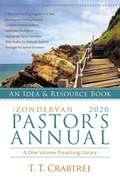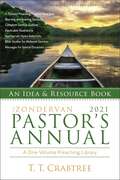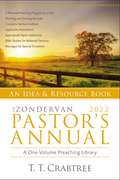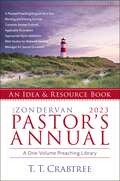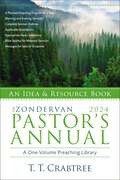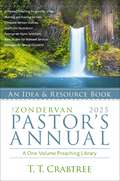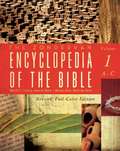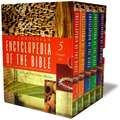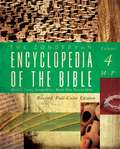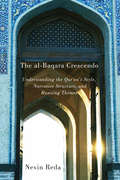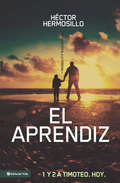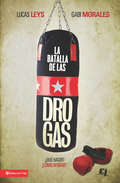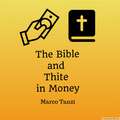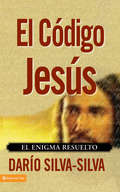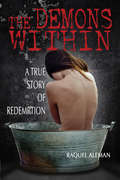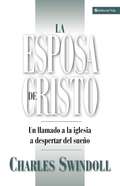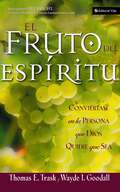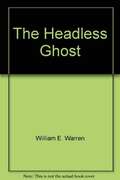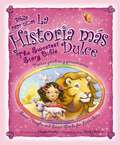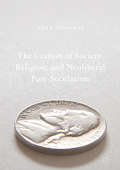- Table View
- List View
The Zondervan 2020 Pastor's Annual: An Idea and Resource Book
by T. T. CrabtreeCountless preachers have turned to the Zondervan Pastor's Annual to save them time in sermon and service preparation. This tried-and-true resource makes your demanding job as a pastor a lot easier. Use its contents as is, or tailor it to fit your unique approach.The Zondervan 2020 Pastor's Annual supplies you with:Morning and evening services for every Sunday of the yearSermon topics and texts fully indexedDefinitive and usable sermon outlinesDevotionals and Bible studies for midweek servicesFresh and applicable illustrationsAppropriate hymn selectionsSpecial-day services for church and civil calendarsMeditations on Lord's Supper observanceWedding ceremonies and themesFuneral messages and ScripturesBasic pastoral ministry helpsMessages for children and young peopleOffertory prayers
The Zondervan 2021 Pastor's Annual: An Idea and Resource Book
by T. T. CrabtreeCountless preachers have turned to the Zondervan Pastor's Annual to save them time in sermon and service preparation. This tried-and-true resource makes your demanding job as a pastor a lot easier. Use its contents as is, or tailor it to fit your unique approach.The Zondervan 2021 Pastor's Annual supplies you with:Morning and evening services for every Sunday of the yearSermon topics and texts fully indexedDefinitive and usable sermon outlinesDevotionals and Bible studies for midweek servicesFresh and applicable illustrationsAppropriate hymn selectionsSpecial-day services for church and civil calendarsMeditations on Lord's Supper observanceWedding ceremonies and themesFuneral messages and ScripturesBasic pastoral ministry helpsMessages for children and young peopleOffertory prayers
The Zondervan 2022 Pastor's Annual: An Idea and Resource Book
by T. T. CrabtreeCountless preachers have turned to the Zondervan Pastor's Annual to save them time in sermon and service preparation. This tried-and-true resource makes your demanding job as a pastor a lot easier. Use its contents as is, or tailor it to fit your unique approach.The Zondervan 2022 Pastor's Annual supplies you with:Morning and evening services for every Sunday of the yearSermon topics and texts fully indexedDefinitive and usable sermon outlinesDevotionals and Bible studies for midweek servicesFresh and applicable illustrationsAppropriate hymn selectionsSpecial-day services for church and civil calendarsMeditations on Lord's Supper observanceWedding ceremonies and themesFuneral messages and ScripturesBasic pastoral ministry helpsMessages for children and young peopleOffertory prayers
The Zondervan 2023 Pastor's Annual: An Idea and Resource Book
by T. T. CrabtreeCountless preachers have turned to the Zondervan Pastor's Annual to save them time in sermon and service preparation. This tried-and-true resource makes your demanding job as a pastor a lot easier. Use its contents as is, or tailor it to fit your unique approach.The Zondervan 2023 Pastor's Annual supplies you with:Morning and evening services for every Sunday of the yearSermon topics and texts fully indexedDefinitive and usable sermon outlinesDevotionals and Bible studies for midweek servicesFresh and applicable illustrationsAppropriate hymn selectionsSpecial-day services for church and civil calendarsMeditations on Lord's Supper observanceWedding ceremonies and themesFuneral messages and ScripturesBasic pastoral ministry helpsMessages for children and young peopleOffertory prayers
The Zondervan 2024 Pastor's Annual: An Idea and Resource Book
by T. T. CrabtreeCountless preachers have turned to the Zondervan Pastor's Annual to save them time in sermon and service preparation. This tried-and-true resource makes your demanding job as a pastor a lot easier. Use its contents as is, or tailor it to fit your unique approach.The Zondervan 2024 Pastor's Annual supplies you with:Morning and evening services for every Sunday of the yearSermon topics and texts fully indexedDefinitive and usable sermon outlinesDevotionals and Bible studies for midweek servicesFresh and applicable illustrationsAppropriate hymn selectionsSpecial-day services for church and civil calendarsMeditations on Lord's Supper observanceWedding ceremonies and themesFuneral messages and ScripturesBasic pastoral ministry helpsMessages for children and young peopleOffertory prayers
The Zondervan 2025 Pastor's Annual: An Idea and Resource Book
by T. T. CrabtreeCountless preachers have turned to the Zondervan Pastor's Annual to save them time in sermon and service preparation. This tried-and-true resource makes your demanding job as a pastor a lot easier. Use its contents as is, or tailor it to fit your unique approach.The Zondervan 2025 Pastor's Annual supplies you with:Morning and evening services for every Sunday of the yearSermon topics and texts fully indexedDefinitive and usable sermon outlinesDevotionals and Bible studies for midweek servicesFresh and applicable illustrationsAppropriate hymn selectionsSpecial-day services for church and civil calendarsMeditations on Lord's Supper observanceWedding ceremonies and themesFuneral messages and ScripturesBasic pastoral ministry helpsMessages for children and young peopleOffertory prayers
The Zondervan Encyclopedia of the Bible, Volume 1: Revised Full-Color Edition
by Moisés Silva Merrill C. TenneyRevised edition. Volume 1 of 5. The Zondervan Encyclopedia of the Bible has been a classic Bible study resource for more than thirty years. Now thoroughly revised, this new five-volume edition provides up-to-date entries based on the latest scholarship. Beautiful full-color pictures supplement the text, which includes many new articles in addition to thorough updates and improvements of existing topics. Different viewpoints of scholarship permit a well-rounded perspective on significant issues relating to doctrines, themes, and biblical interpretation. The goal remains the same: to provide pastors, teachers, students, and devoted Bible readers with a comprehensive and reliable library of information. • More than 5,000 pages of vital information on Bible lands and people • More than 7,500 articles alphabetically arranged for easy reference • Hundreds of colorful maps, illustrations, charts, and graphs • Scholarly articles ranging across the entire spectrum of theological and biblical topics, backed by the most current body of archaeological research • Over 250 contributors from around the world • Introductions to each book of the Bible • Bibliographies and helpful cross-references
The Zondervan Encyclopedia of the Bible, Volume 2: Revised Full-Color Edition
by Moisés Silva Merrill C. TenneyRevised edition. Volume 2 of 5. The Zondervan Encyclopedia of the Bible has been a classic Bible study resource for more than thirty years. Now thoroughly revised, this new five-volume edition provides up-to-date entries based on the latest scholarship. Beautiful full-color pictures supplement the text, which includes new articles in addition to thorough updates and improvements of existing topics. Different viewpoints of scholarship permit a wellrounded perspective on significant issues relating to doctrines, themes, and biblical interpretation. The goal remains the same: to provide pastors, teachers, students, and devoted Bible readers a comprehensive and reliable library of information. • More than 5,000 pages of vital information on Bible lands and people • More than 7,500 articles alphabetically arranged for easy reference • Hundreds of full-color and black-and-white illustrations, charts, and graphs • 32 pages of full-color maps and hundreds of black-and-white outline maps for ready reference • Scholarly articles ranging across the entire spectrum of theological and biblical topics, backed by the most current body of archaeological research • 238 contributors from around the world
The Zondervan Encyclopedia of the Bible, Volume 3: Revised Full-Color Edition
by Moisés Silva Merrill C. TenneyRevised edition. Volume 3 of 5. The Zondervan Encyclopedia of the Bible has been a classic Bible study resource for more than thirty years. Now thoroughly revised, this new five-volume edition provides up-to-date entries based on the latest scholarship. Beautiful full-color pictures supplement the text, which includes new articles in addition to thorough updates and improvements of existing topics. Different viewpoints of scholarship permit a wellrounded perspective on significant issues relating to doctrines, themes, and biblical interpretation. The goal remains the same: to provide pastors, teachers, students, and devoted Bible readers a comprehensive and reliable library of information. • More than 5,000 pages of vital information on Bible lands and people • More than 7,500 articles alphabetically arranged for easy reference • Hundreds of full-color and black-and-white illustrations, charts, and graphs • 32 pages of full-color maps and hundreds of black-and-white outline maps for ready reference • Scholarly articles ranging across the entire spectrum of theological and biblical topics, backed by the most current body of archaeological research • 238 contributors from around the world
The Zondervan Encyclopedia of the Bible, Volume 4: Revised Full-Color Edition
by Moisés Silva Merrill C. TenneyRevised edition. Volume 4 of 5. The Zondervan Encyclopedia of the Bible has been a classic Bible study resource for more than thirty years. Now thoroughly revised, this new five-volume edition provides up-to-date entries based on the latest scholarship. Beautiful full-color pictures supplement the text, which includes new articles in addition to thorough updates and improvements of existing topics. Different viewpoints of scholarship permit a wellrounded perspective on significant issues relating to doctrines, themes, and biblical interpretation. The goal remains the same: to provide pastors, teachers, students, and devoted Bible readers a comprehensive and reliable library of information. • More than 5,000 pages of vital information on Bible lands and people • More than 7,500 articles alphabetically arranged for easy reference • Hundreds of full-color and black-and-white illustrations, charts, and graphs • 32 pages of full-color maps and hundreds of black-and-white outline maps for ready reference • Scholarly articles ranging across the entire spectrum of theological and biblical topics, backed by the most current body of archaeological research • 238 contributors from around the world
The Zondervan Encyclopedia of the Bible, Volume 5: Revised Full-Color Edition
by Moisés Silva Merrill C. TenneyRevised edition. Volume 5 of 5. The Zondervan Encyclopedia of the Bible has been a classic Bible study resource for more than thirty years. Now thoroughly revised, this new five-volume edition provides up-to-date entries based on the latest scholarship. Beautiful full-color pictures supplement the text, which includes new articles in addition to thorough updates and improvements of existing topics. Different viewpoints of scholarship permit a wellrounded perspective on significant issues relating to doctrines, themes, and biblical interpretation. The goal remains the same: to provide pastors, teachers, students, and devoted Bible readers a comprehensive and reliable library of information. • More than 5,000 pages of vital information on Bible lands and people • More than 7,500 articles alphabetically arranged for easy reference • Hundreds of full-color and black-and-white illustrations, charts, and graphs • 32 pages of full-color maps and hundreds of black-and-white outline maps for ready reference • Scholarly articles ranging across the entire spectrum of theological and biblical topics, backed by the most current body of archaeological research • 238 contributors from around the world
The [european] Other In Medieval Arabic Literature And Culture
by Nizar F. HermesContrary to the monolithic impression left by postcolonial theories of Orientalism, the book makes the case that Orientals did not exist solely to be gazed at. Hermes shows that there was no shortage of medieval Muslims who cast curious eyes towards the European Other and that more than a handful of them were interested in Europe.
The al-Baqara Crescendo: Understanding the Qur'an's Style, Narrative Structure, and Running Themes
by Nevin RedaHow is the Qur'an organized? Does its structure convey meaning? Why did the Islamic tradition neglect the study of the Qur'an's unusual configuration until the twentieth century? In The al-Baqara Crescendo, Nevin Reda introduces a bold new avenue of research: the poetics of Qurʾanic narrative structure. Focusing on Surat al-Baqara, the longest and most challenging of the suras, she uncovers the beauty and rationale behind the Qurʾan’s unusual organization. Reda argues that the sura – often dismissed by Muslim traditionalists and Orientalist critics as a baffling collection of disjointed material – can be appreciated as a coherent composition if it is approached as an oral text. Calling attention to oral organizational techniques such as repetition, this book’s repertoire of figures showcases Surat al-Baqara’s ingenious layout and pinpoint the sophisticated meanings that are embedded within it. Incorporating insights from literary theory and Biblical studies, the author advances inclusivity and intercultural bridge-building in the study of scripture. In an engaging narrative that is bound to captivate and challenge the reader, Reda communicates a deep love and thorough command of her subject, all while presenting a significant new development in Islamic hermeneutics.
The al-Baqara Crescendo: Understanding the Qur'an's Style, Narrative Structure, and Running Themes (Advancing Studies in Religion)
by Nevin RedaRecent manuscript evidence from al-Jami` al-Kabir in ?an ‘a’ suggests that the Qur’an took its final shape well before 671 CE. Irrespective, however, of who composed it or when it was compiled, questions remain about whether the Qur’an followed any kind of preconceived plan or compositional schema that makes sense in today’s world. In The al-Baqara Crescendo, Nevin Reda introduces a bold new avenue of research: the poetics of Qur'anic narrative structure. Focusing on Surat al-Baqara, the longest and most challenging of the suras, she explores the beauty and rationale behind the Qur'an’s unusual organization. Reda argues that the sura – often dismissed by Muslim traditionalists and Orientalist critics as a baffling collection of disjointed material – can be appreciated as a coherent composition if it is approached as a spoken text. Calling attention to oral organizational techniques such as repetition, this book’s repertoire of figures showcases Surat al-Baqara’s ingenious layout and pinpoints the sophisticated meanings that are embedded within it. Incorporating insights from literary theory and Biblical studies, the author advances inclusivity and intercultural bridge-building in the study of scripture. In an engaging narrative that is bound to captivate and challenge the reader, Reda communicates a deep love and thorough command of her subject, all while presenting a significant new development in Islamic feminist hermeneutics.
The aprendiz: De lo celestial a lo terrenal 1 y 2 de Timoteo
by Hector HermosilloEste libro, el tercero de la Serie, presenta una exposición y un comentario a profundidad sobre cada uno de los capítulos de las dos epístolas a Timoteo, con el propósito de hacer su mensaje más accesible a los lectores que no estén familiarizados con el texto bíblico, al mismo tiempo que proporciona una narración rica en detalles que mejora la comprensión, incluso del lector que más conocimientos teológicos tenga. La Palabra es aplicada a la vida moderna a través de este estudio totalmente nuevo de cinco libros de la Biblia que son fundamentales para la vida práctica diaria del creyente.
The batalla de las drogas
by Lucas LeysEste libro, el Dr. Lucas Leys, trata uno de los temas más calientes con los que en algún momento te vas a tener que confrontar. Está escrito para jóvenes que luchan con este desafío o que tienen amigos que los están enfrentando. En estas páginas te vas a encontrar con muchos datos investigativos y variadas preguntas que te van a hacer pensar. El autor cree que la ignorancia no es buena consejera y que esta generación no se conforma con que alguien les diga que algo es malo sin recibir una explicación coherente y honesta. Un libro apuntado al blanco, escrito por uno de los más renombrados líderes y especialista de la nueva generación.
The bible and thite in money
by Marco TanziWhat is tithe in the Christian church? Is it true that if we do not give 10% of our paycheck to the church we rob God? This book, based on the Bible, is rich in biblical references to help us truly understand what tithe is, starting with Abraham when he gave tithe to Melchisedek, continuing through the Old Testament, and finally dealing with tithe as dealt with by Jesus Christ and the New Testament. A book to learn how to not be naïve and not let yourself be deceived by doctrines of false teachers.
The código Jesús: El enigma resuelto
by Sr. Dario Silva-SilvaSe ha puesto de moda la interpretación de códigos misteriosos: el Código del Genoma Humano, el Código Secreto de la Biblia, el Código Da Vinci, etc. Pero hay un icono eterno: la cruz, inconmovible sobre la cumbre del mundo, como la gran incógnita que unos quieren resolver y otros disolver.
The demons within
by Raquel AlemanFourteen-year-old Raquel didn’t know why entities tormented her on a daily basis, but she did know that the phenomenon started days after her uncle attempted to rape her for the third time. When her sister’s boyfriend, Rojelio Joel Cardenas, whom Raquel barely knew, showed up at her parents’ door, Raquel thought nothing of it. Two hours later, Raquel is ushered into the living room and told that she and R. J. are to get married. In her naiveté, Raquel believed that moving away would stop the invisible beings and voices from tormenting her. But, twelve years later, suffering daily physical attacks by the invisible beings and living in an abusive and loveless marriage, Raquel is losing hope. When R. J. introduces her to Eliazar De Castello, a new work partner, Raquel is resistant. Something about Eliazar unsettles her very soul. Soon Raquel becomes aware of the charged atmosphere that crackles between them. Fighting the passion that is brewing in her heart, Raquel soon realizes that she is losing the battle. But can she trust Eliazar with her heart? Is he really who he appears to be, or is he someone even more sinister than the beings that surround her?
The esposa de Cristo: Un llamado a la Iglesia a despertar del sueño
by Charles R. SwindollLa promesa de la venida de Cristo nos espera tras las sombras del horizonte. Tal vez sólo falten unas horas para el alba. Y la hora más oscura de la noche es inmediatamente antes del amanecer. Para la esposa de Cristo es hora de atizar el fuego, encender las lámparas y dispar las sombras.
The fruto del Espíritu: Conviértase en la persona que Dios quiere que sea
by Thomas E. Trask Wayde I. Goodall¿Desea una vida llena de satisfacción? ¿Relaciones saludables? ¿Victoria sobre el conflicto y la ansiedad? Puede tenerlos si deja que el Espíritu de Dios desarrolle su fruto en su corazón. En este libro Tom Trask y Wayde Goodall le harán examinar el amor, la alegría, la paciencia, la amabilidad y el resto del Fruto del Espíritu. Esto es un vistazo a lo que sucede con nuestros pensamientos, emociones y acciones cuando vivimos cada día en relación íntima con Jesucristo. Extrayendo del almacén de la palabra de Dios, Trask y Goodall plantan semillas en nuestros corazones que condenan y, a la vez, alientan. Muestran como uno puede cooperar con la obra de Dios en nuestra vida. Asimismo, dan ejemplos de como nos podemos distinguir cuando deja que el Espíritu de Dios reproduzca la persona de Jesucristo en nuestra vida. Nuestro testigo por Cristo es tan bueno como el fruto que produce nuestra relación con él. Este libro cambiara su estilo de vida actual por uno donde el evangelio que proclama atraerá a otros al ver los resultados.
The gift
by Barbara LarrivaFifteen-year-old Dove Sanders is nothing like her sister Maddy. Whereas her twin is dark, slim, and blessed with inner grace, Dove is gangly, red-haired, pale, and filled with discontent. Then one night Dove discovers that she has the gift of healing—and her entire life is suddenly and dramatically changed.. THE GIFT is the moving tale of an adolescent’s spiritual maturation and her ultimate understanding of God’s love. • “Larriva is well on her way to becoming the newest addition to a long list of famous writers.” Arizona Living Magazine
The headless ghost: True tales of the unexplained
by William E WarrenTHE “TALES OF THE UNEXPLAINED" IN this book have been presented as true tales, for the simple reason that they have withstood the test of time; that is, they have never been disproven or shown to be anything other than true, in spite of many investigations and at¬tempts to prove otherwise over the years.
The historia mas dulce / The Sweetest Story Bible: Tiernas palabras y pensamientos para niñas / Sweet Thoughts and Sweet Words for Little Girls
by Diane StortzLa Cosa Más dulce de todas Las cosas más dulces rodean la vida de su pequeñina: corazones y flores, gatitos y perritos, paraguas y juegos de té, besos y abrazos. Esta Biblia es una selección de historias escogidas que muestran el verdadero amor de Dios hacia ellas. Una colección hermosa que su niña no olvidará jamás. The Sweetest Thing of All The sweetest thing surrounds your little girl’s life: hearts and flowers, kittens and puppies, umbrellas and tea parties, kisses and hugs. A collection of carefully selected Bible stories that show them God’s amazing love for them. Your little girl will never forget this beautiful collection.
The i-zation of Society, Religion, and Neoliberal Post-Secularism
by Adam PossamaiThis book explores the elective affinity of religion and post-secularism with neoliberalism. With the help of digital capitalism, neoliberalism dominates, more and more, all aspects of life, and religion is not left unaffected. While some faith groups are embracing this hegemony, and others are simply following the signs of the times, changes have been so significant that religion is no longer what it used to be. Linking theories from Fredric Jameson and George Ritzer, this book presents the argument that our present society is going through a process of i-zation in which (1) capitalism dominates not only our outer, social lives (through, for example, global capitalism) but also our inner, personal lives, through its expansion in the digital world, facilitated by various i-technology applications; (2) the McDonaldization process has now been normalized; and (3) religiosity has been standardized. Reviewing the new inequalities present in this i-society, the book considers their impact on Jurgen Habermas's project of post-secularism, and appraises the roles that various religions may have in supporting and/or countering this process. It concludes by arguing that Habermas's post-secular project will occur but that, paradoxically, the religious message(s) will be instrumentalized for capitalist purposes.
